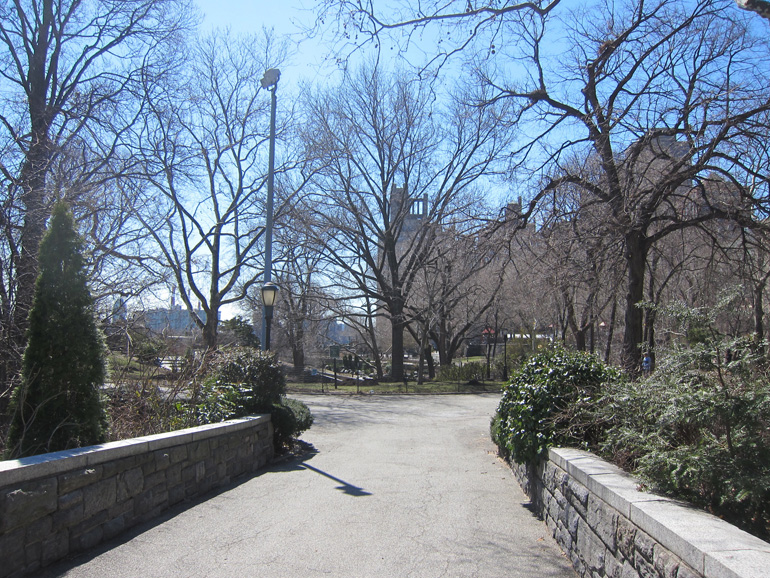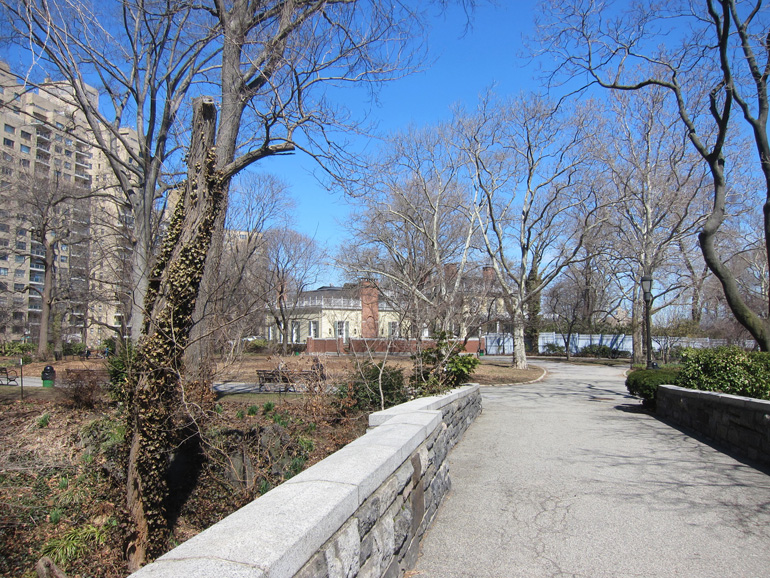Gotham Diary:
Just So
2 April 2014
At the bottom of this entry, you will find another photograph. Both images were shot from the same spot, looking in opposite directions. I wanted to celebrate my return to Carl Schurz Park by explaining how it came to be what it is today.
Robert Moses, Grand Pooh Bah (it didn’t really matter which title he was wearing), had a flat at One Gracie Square, the building more or less in the center, above. It’s the last near building on the left. (More distant structures are on Roosevelt Island and in Queens.) Every day, when Moses left his apartment, what he saw across the street was the wilderness of the abandoned Gracie Estate. At the far end of this property stood Gracie Mansion. That’s the yellow house in the picture at the bottom. That’s where Bill de Blasio, the new mayor of New York City, lives with his family.
Thanks to Robert Moses’s bright idea.
Moses liked to maintain close contact with the mayor of the city, whoever that might be; he generally nabbed the first appointment in the mayor’s daily calendar.
It occurred to Moses that he might walk to this appointment — if the mayor lived in Gracie Mansion. So he persuaded the mayor of the moment, Fiorello LaGuardia — who, no Michael Blumberg he, lived in a Greenwich Village walkup — to move into the renovated house. The grounds of the estate were magically transformed into Carl Schurz Park, arguably the most multifaceted park (per acre) in Manhattan.
The new East River Drive (today’s FDR — its landfill foundations consisting of rubble from the London blitz, brought over as ballast in otherwise empty freighters) was topped by a riverside promenade. In a matter of minutes, Moses could stroll from his apartment to the mayor’s office. So much more convenient! If he wanted a change, he could follow one of the park’s many intriguing paths, getting plenty of exercise on the abundant flights of steps. He could cross the pretty little bridge from which I took my pictures. The bridge traverses a little walk that slopes down through the plantations until it reaches a small, round plaza, with a statue of Peter Pan in the center. You would never guess, standing there, how close, as the worm burrows, the roaring FDR traffic is. The plaza and the bridge are about as pointlessly decorative as you can get without actually building a monument to something.
***
It’s a lovely story, and I made a lot of it up. Not everything, but so much, frankly, that, if I were you, I would corroborate every detail myself. The real story — well, it’s not a story, for one thing. It’s a complicated sequence of greater and lesser alterations (that’s how the city changes) that, were I to begin to relate it, would have you begging me to say a few (more) words about Hannah Arendt instead.
I did not make up the bit about the rubble of the blitz, though. That would have been unseemly. The rubble was just about all that Britain could spare as cargo for ships returning to the United States for urgently-needed supplies.
But, oh! To be in the park! How long has it been? Certainly I had not been to the park since the New Year, and almost certainly not for months prior to that, either. The park had a spare, windswept feel to it, owing partly to the complete lack of arboreal leafage but also to the quiet, unbelieving happiness of the people sitting on the benches, rediscovering the delight of sitting outside for pleasure. Lately quite unimaginable!
Tomorrow, I am going to visit the florist’s over on Lexington Avenue, to see what, if anything, they’ve got for the balcony. (If they having nothing at all, I won’t be surprised.) I want something to fuss over out there, and if need be will repot the spider plant that I’ve had rooting by the kitchen sink. The ivy in the large tub looks dead, although Ray Soleil assures me that it isn’t; the much smaller-leaved varicolored ivy that I planted by the wall seems to be doing well, and I have high hopes of its climbing a couple of inches of trellis this year. Everything else of a vegetable nature is extinct. Everything not vegetable is filthy. So there’s plenty to do.
Outside! What a concept.
***
Regular readers will not be surprised that my light reading, lately, has been the correspondence that Hannah Arendt kept up with Mary McCarthy from 1949 until her death, in 1975. Carol Brightman’s edition of the letters, Between Friends, has been a treasure of my library since it was published, in 1995. I can’t remember just what the attraction was back then, but it may simply have been the back-and-forth between two writers.
The pace of the correspondence picked up in 1959, I forget why. McCarthy was about to settle down with her last husband, James West, a Foreign Service officer attached to the OECD, and Arendt was instrumental in expediting her divorce from Bowden Broadwater. Flipping through the book to ascertain all of this — no more inventions! — I came across the following bonbon. Hannah to Mary, 20 June 1960.
I was away from New York, an idiotic affair at Baltimore, honorary degrees together with Margaret Mead, a monster, and Marianne Moore, an angel. Only one nice thing to report: we were talking about being taken to college next morning and being fetched separately, each one by her department. I said non-committally: nice of them to bother, or something to that effect. Whereupon Mead (one better call her only by her second name, not because she is a man, but because she certainly is not a woman) launched into a diatribe [about] how much all these people enjoy being with US — celebrities, etc. Before I could even get properly mad, Marianne Moore: “My, my, I can only hope we will be enjoyable.” And that was that.
I’d like to know more about why Arendt thought what she did about “Mead.”
I thought that I had read Between Friends through quite conscientiously when I bought it, but I had no recollection whatever — and surely I’d not have forgotten! — of W H Auden’s turning up at Arendt’s door with an offer of marriage, quite indecently soon after the death of her husband, Heinrich Blücher, in 1970. She turned him down — she and McCarthy both state that to do otherwise would have been “suicide” — but she gathered that Auden was so bitterly disappointed about not getting a chair at Oxford, or somesuch, that his fallback was to propose to a number of ladies, and she felt very sorry for him, which only made things worse.
I don’t know what to do. When he left he was completely drunk, staggering into the elevator. I did not go with him. I hate, am afraid of pity, always have been, and I think I never knew anybody who aroused my pity to this extent.
It turned out that Stephen Spender had already sounded out McCarthy about this proposal, on Auden’s behalf. “Are you mad?” she replied. In her letter to Arendt, she went on,
Anyway, of course I shall say nothing to Spender when I see him again. It’s typical of a homosexual — I mean Spender — to have been married for twenty years and know so little about marriage that he could venture such a thought.
Comble!


